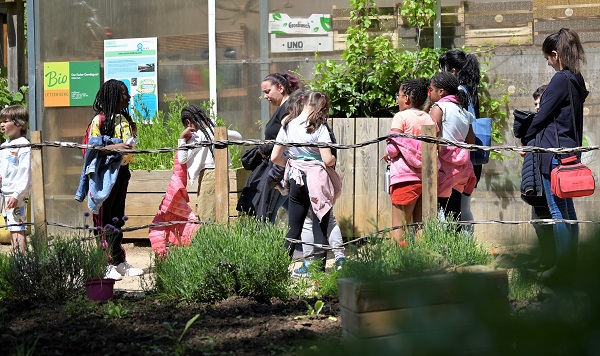 Credit: MENEJ
Credit: MENEJ
A new educational garden project, aimed at allowing children and young people to discover nature, recently launched in Luxembourg.
On Wednesday 24 May 2023, Luxembourg's Minister of Education, Children and Youth, Claude Meisch, the Minister for the Environment, Climate and Sustainable Development, Joëlle Welfring, and the Minister of Agriculture, Viticulture and Rural Development, Claude Haagen, presented the "Léieren am Gaart – Reseau Lëtzebuerg" (LAG; learning in the garden - Luxembourg network) project.
This collaborative and transversal project aims to bring together different educational actors, namely education and childcare structures, primary schools and secondary education establishments, with local and municipal actors to create a network of educational gardens.
"For some time, learning no longer takes place exclusively in the classroom. Learning outdoors, in the school garden and in nature, means learning in a concrete and practical context. By planning the garden, planting, observing and, of course, tasting, children develop important cross-curricular skills that make them stronger for life," said Minister Meisch.
According to the ministries involved, the LAG project responds to one of the recommendations issued by the CNEL national students' conference as part of the national "climateXchange" consultations in 2019, namely the creation and promotion of educational gardens.
Minister Haagen praised the didactic and social value of this interministerial project: "The development of new educational gardens fits perfectly into our approach to raising children's awareness of seasonal food from short circuits. Fruits and vegetables from our own garden always taste the best!"
Through learning in the garden, children and young people can become aware of the benefits of seasonal and local production, whether it is the taste of fresh vegetables straight from the garden or the contribution to sustainable and responsible use for nature and climate protection. In urban areas, such a garden, even a small one, can have a particularly positive effect in terms of improving the quality of life and enhancing biodiversity, noted the ministries in a press release.
Minister Welfring emphasised that this is a crucial point in the development of this project: "In these gardens, children not only learn how our local food is produced, but they also reconnect more with nature. This awareness is essential, as it lays the groundwork for a more comprehensive understanding of environmental and climate protection. According to the motto: man protects what he loves".
Currently, the LAG project includes 40 Léiergäert (educational gardens) across Luxembourg, initiated by 23 primary schools (often in collaboration with a "maison relais" childminding service), nine secondary schools, two "maisons relais", two crèches and four other non-formal education structures. A map locating the different gardens is accessible, along with other information and teaching material, online (currently available in Luxembourgish) at www.leierenamgaart.lu.
The member gardens of the LAG network benefit from professional support, which includes both continuous training and didactic and educational material. The Centre d'Initiative et de Gestion Local (CIGL) of Esch-sur-Alzette supports educational establishments wishing to set up an educational garden and has developed, in collaboration with the SCRIPT service of the Education Ministry, an educational kit containing information sheets on the different vegetables to be grown in educational gardens.
With the establishment of a vast network, the LAG project aims to promote exchanges between the educational staff who take care of these educational gardens. Registration to the network via the aforementioned website is free.
The LAG project is led by the CIGL-Esch ASBL and its environmental education centre Kalendula, in collaboration with the Ministry of the Environment, Climate and Sustainable Development, the Ministry of Education, Children and Youth and the Ministry of Agriculture, Viticulture and Rural Development.








